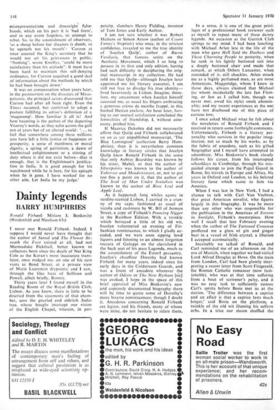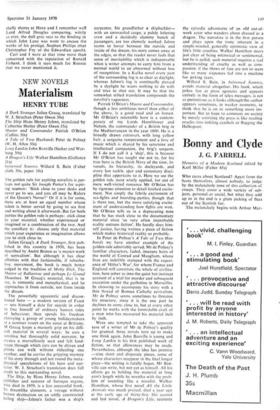Dainty legends
BARRY HUMPHRIES
Ronald Firbank Miriam J. Benkovitz (Weidenfeld and Nicolson 63s) I never met Ronald Firbank. Indeed, I suppose I would never have thought that the author of Santal and The Flower Be- neath the Foot existed at all, had not Marmaduke Pickthall, better known to collectors born since the death of Nat King Cole as the Koran's most inaccurate trans- lator, once nudged me, on one of his rare visits to Bond Street, at a private view of Marie Laurencin drypoints; and I saw, through the lilac haze of Sullivan and Powell, albeit briefly, Ronnie.
Thirty years later I found myself in the Reading Room of the Royal British Club, Lisbon. As you know, there is little to be descried from the casements of that cham- ber, save the gnarled and eldritch Judas tree, whose boughs intercept our vision of the English Chapel, wherein, in per4 petuity, slumbers Henry Fielding, inventor of Tom Jones and Early Author.
I am not sure whether it was Robert Hichens or Simon Arrow (author of Count Fanny's Nuptials) who once, in the strictest confidence, revealed to me the true identity of 'Jocelyn Quilp', author of Baron Verdigris, that famous satire on the Aesthetic Movement, which I so long to possess in its first and only edition, having had such difficulty in deciphering the orig- inal manuscript in my collection. He had told me that Quilp—although Jocelyn later appointed me his literary executor, I am still not free to divulge his true identity— lived luxuriously in Lisbon. Imagine, there- fore, my amazement when Jocelyn himself accosted me, as usual his fingers embracing a generous creme de menthe frappe, in this hushed Iberian enclave. An hour later, hav- ing to our mutual satisfaction concluded the formalities of friendship, I, without cere- mony, probed him.
If Maurice Dekobra did not necessarily affirm that Quilp and Firbank collaborated on an as yet unpublished manuscript, 'The Blue Lamington' (collection Barry Hum- phries), then it is nevertheless common knowledge in literary circles that Jocelyn Quilp knew Ronald Firbank in the sense that only Aubrey Beardsley was known by his sister, Mabel, or that the author of Silverpoints was known to the author of Tuberose and Meadowsweet, or, not to put too fine a point on it, that the author of The Soul of Man Under Socialism was known to the author of Rose Leaf and Apple Leaf.
As it happened, long whiles agone in sardine-scented Lisbon, I carried in a cran- ny of my cape, fashioned as usual of vicuña and cashmere by W. Bill of Jermyn Street, a copy of Firbank's Prancing Nigger in the Rainbow Edition. With a twinkle which betrayed a little of his old wit, Jocelyn volunteered an evening of Fir- bankian reminiscence, to which I gladly ac- ceded, and we were soon sipping lewd liquors and listening to an almost forgotten toccata of Galuppi on the clavichord in the back seat of his puce Lagonda, much to the astonishment of the Estoril peasantry. Jocelyn's chauffeur Dorothy had known Firbank for many years, indeed since his early days in the Coldstream Guards, and was a fount of anecdote whenever the author of Odette or The New Rythum [sic] was evoked. I hope in the space of this brief appraisal of Miss Benkovitz's new and copiously documented biography there will be time to quote some of Dorothy's more bizarre reminiscences; though I doubt it. Anecdotes concerning Ronald Firbank are legion, and his friends, many of whom were mine, do not hesitate to relate them. In a sense, it is one of the great privi- leges of a professional book reviewer such as myself to repeat many of these dainty legends. An occasion at the Garrick Club springs to my mind. I had been lunching with Michael Arlen late in the life of the man who gave Hell Said the Duchess and These Charming People to posterity, when he sank in his lightly buttoned suit into a deeply buttoned chair and made that remark, at which Osbert Lancaster, when reminded of it, still chuckles. Arlen struck me as a highly perfumed man, as are most Armenians. Muggeridge, whom I knew in those days, always claimed that Michael (to whom incidentally the late Ian Flem- ing, or Ian as I called him, though we never met, owed his style) smelt abomin- ably; and my recent experiences at the Bac have not disabused me of this piece of curious lore.
I once asked Michael what he felt about the novelettes of Ronald Firbank and I received in return some forthright comments. Unfortunately, Firbank is a literary per- sonality who survives in the popular imag- ination, not so much by his works, as by the fabric of anecdote, such as his gifted biographer and I myself have attempted to adumbrate. Miss Benkovitz's book closely follows his career, from his interrupted schooldays to Cambridge, through his mis- guided attempt to join the Papal Guard in Rome, his travels in Europe and Africa, his years in Oxford and London, to his belated literary fame which came to him via America.
When I was last in New York, I had a chance to talk with Carl Van Vechten, . that great American novelist, who figures largely in this biography. It was he more than any other who was responsible for • the publication in the Americas of Sorrow in Sunlight, Firbank's masterpiece. How well I recall that late February evening when the author of The Tattooed Countess proffered me a glass of gin and ginger beer in a vessel of Irish crystal; a libation I accepted automatically.
Inevitably we talked of Ronald, and Carl reminded me of an afternoon on the eve of Munich, when together we had visited Lord Alfred Douglas at Hove. On the train from London, Carl had been glumly inter- preting a recent letter from Scott Fitzgerald, the Roman Catholic romancer (now fash- ionable), who was at that time suffering from a bout of scrivener's palsy, and it was no easy task to sufficiently restore Carl's spirits before Bosie met us at the station. 'The difference between a caprice and an affair is that a caprice lasts much longer,' said Bosie on the platform, a twinkle of the old wit illuming his saffron orbs. In a trice our shoon shuffled the
Shelly shores at Hove and I remember well Lord Alfred Douglas comparing, wittily as ever, the dull grey seas to the binding in which John Lane was wont to encase the works of his protégé, Stephen Phillips (that Christopher Fry of the Edwardian epoch).
Carl and I were at that time more than concerned with the reputation of Ronald Firbank. I think it says much for Ronnie that we never mentioned it.



































 Previous page
Previous page